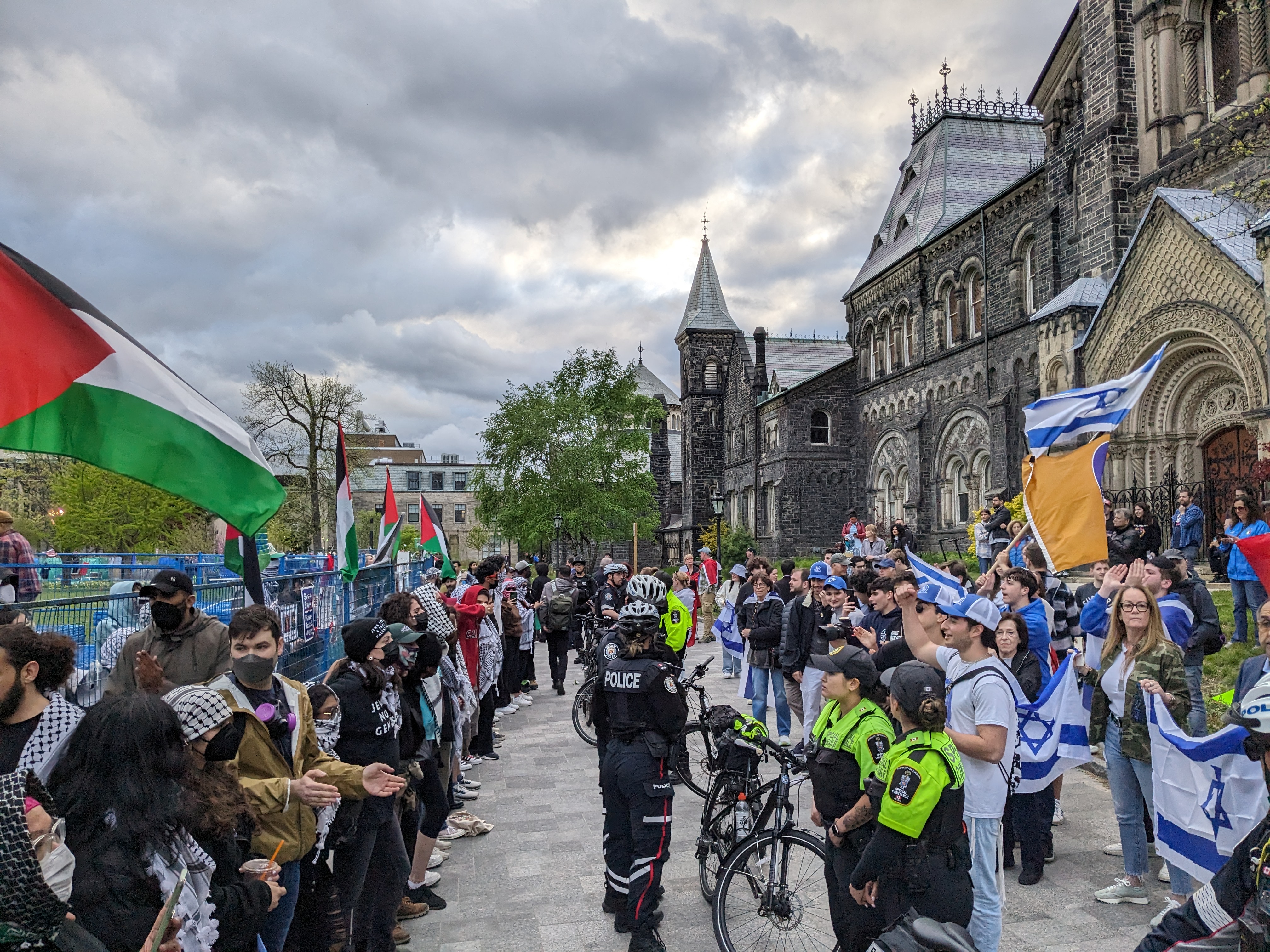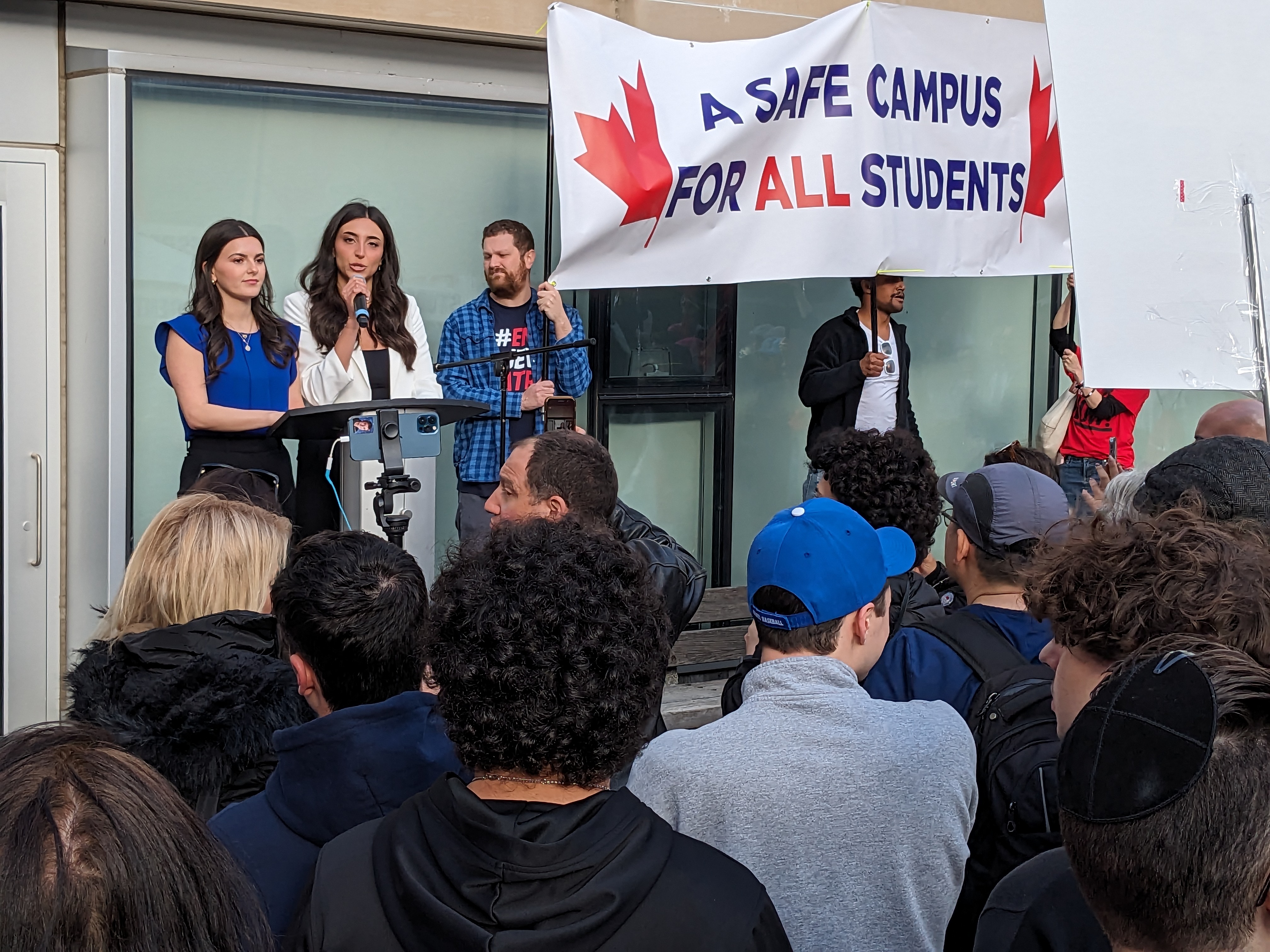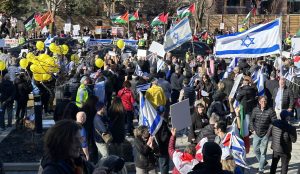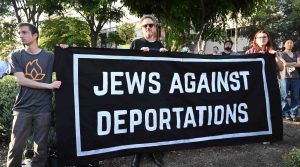Two weeks ago, in the early dawn hours of May 2, pro-Palestine protesters set up 55 tents on the grassy King’s College Circle at the University of Toronto.
With the number of tents growing, now up to 120 as of May 13, and discussions ongoing between protesters and the university, Jewish students and professors are divided on the impact of protest.
Whether the encampment creates safety risks or fosters antisemitism toward Jewish faculty and students on the downtown campus depends on which Jewish people one asks.
Protesters say it’s the far-right pro-Israel counter-protesters making things unsafe when they come to the encampment to agitate.
Most of the rest of the UofT Jewish community, if they’ve said much publicly at all, would seem to disagree, citing chants, signs, and behaviour they say make them feel unwelcome on campus and unable to access the beautiful lawn in the quad. Some students who spoke with The CJN say they’ve started hiding their Jewish identity on campus.
With messages like “this is the intifada” “glory to all martyrs” and “all Zionists are racists” and “terrorists”—words scrawled in chalk on the ground, seen on signs, or chanted during demonstration—many Jewish students and faculty say it contributes to what they see as antisemitism being tolerated on campus.
The encampment at UofT followed another that started late April at McGill University in Montreal, in a wave of campus protests inspired by the Columbia University encampment in New York. There are now at least 10 to 15 such encampments across Canada; others in the province include Ontario Tech University in Oshawa, Ont., McMaster University in Hamilton, and the University of Ottawa.
The wave of protest encampments that began April at Columbia in New York—McGill’s was the first Canadian encampment—comes after months of large demonstrations in Toronto, and globally, over Israel’s prosecution of its war against Hamas in Gaza following the Oct. 7 attacks on Israel.
The Hamas-run Gaza health ministry has said that more than 35,000 Palestinians have been killed after the attacks that killed 1200 people in Israel with more than 240 hostages taken to Gaza, of which a reported 129 remain. However, those hostages may or may not all be alive: Israel recently received three bodies from Gaza, including two hostages whose alive or dead status had not been known.
In Toronto, the encampment at UofT began at 4 a.m. on May 2, when protesters circumvented a fence the school administration had erected on a grassy quad. Frequent counter-protests outside the encampment entry point have marked its first two weeks.
On May 8, Toronto police on bicycles and campus security officers formed a line to separate Jewish protesters dressed in black, holding a “Jews against Israeli apartheid” banner at the encampment, from Israel flag-waving, largely Jewish counter-protesters. (It was one of two counter-protests that day.)

In a press conference May 13, students said they planned to stay indefinitely until the university addressed their core demands. On May 16, the day after another meeting with university administrators, organizers told reporters UofT was dragging out the process of disclosure and divestment.
Occupy UofT for Palestine says those demands include disclosure of the university’s investments that touch Israeli companies, divestment from any funds involved in producing arms or surveillance technology, and cutting ties between the university and Israeli universities operating in the West Bank.
One encampment representative, in the May 13 press conference, cited the Hebrew University of Jerusalem on Mount Scopus, along with Technion University in Haifa for its involvement with face recognition technology reportedly used by the IDF to target Palestinians.
Organizers say they have asked the university to propose its next moves on the divestment questions before June 30. That’s when the UofT governing council moves into the quieter summer session, and when major decisions, such as what to do about an encampment, are not typically made, organizers told reporters.
In a statement issued on May 16, the university said it “recognize[s] that our entire community has a stake in this matter” and mentioned “we continue to discuss signs and language and emphasize how important it is that they be consistent with the spirit of peaceful protest.”
Meanwhile, UofT Hillel wrote an open letter rebutting claims by the encampment’s Jewish supporters that its anti-Zionist sentiment was not antisemitic.
“We will not stop standing up for ourselves. We are proud to be Jews, and we are proud to be Zionists,” the letter read, with a call to the university community to co-sign.
In addition, Jewish students and faculty held a rally May 8 to demand the university force the encampment to be dismantled.
Kayla Shainhouse, a graduate student in the Munk School of Global Affairs, has been a Jewish organizer on campus for several years, opposing student union votes over boycott and sanctions of Israel. She says that some of the loudest voices might be those supporting the encampment, including some Jews, but that there are Jewish students who are quieter in their opposition.
“There are a lot more people that oppose the encampment than might lead off by looking at it,” she says, referencing conversations in Jewish student WhatsApp groups. “Most people are steering clear.”
Shainhouse says the encampment is disrupting the lives and safety of Jewish students whose numbers in opposition may be underrepresented, and tells The CJN that Hillel and the Centre for Jewish Studies are the only remaining places left on campus that feel comfortable to her.

She also says there’s more than a little irony in the whole situation.
“There are slogans inside [the encampment, on signs or written in chalk] saying… ‘this is an occupation free zone’ but they’re literally occupying the field.”
The demand for UofT to cut ties with academic institutions in Israel concerns Renan Levine, a professor of political science, who says it endangers academic freedom and could negatively impact his own work.
A statement by the University of Toronto Faculty Association supporting the students’ right to free speech should also acknowledge that the students are “calling for encroachment of faculty, academic freedom and research,” he said.
Levine says a paper he’s writing about Israeli Prime Minister Benjamin Netanyahu and the sources of his popularity requires data from an Israeli university. He is concerned that ending relations with Israeli universities could create research barriers and infringe on academic freedom.
“This is going to the core mission of the university, and I find this very disconcerting,” he said.
Significant numbers of Jewish students and faculty say they mostly have avoided the encampment and feel the university should dismantle it without giving in to protesters’ demands.
At the “Rally Against Hate” on May 8, blocks from the occupied quad, Eden Marco from the UofT Jewish Medical Students Association said the encampment fostered “an atmosphere of intimidation for many Jewish students like us.”
“This is not merely an interpretation. Nor is it speculative,” said Marco. “It is a reality marked by signs bearing messages, like ‘Glory to our Martyrs’ and ‘Leave Palestine alone’ and ‘Go back to Europe.’”

“It is the reality marked by a restricted ability to move freely and safely across campus grounds and by instances of targeted harassment. These issues extend beyond political discourse,” Marco told the crowd. “They directly impact our sense of belonging and safety within our university.”
“We believe that every student regardless of their background or identity has the right to learn in a safe and peaceful environment,” said Marco after calling for the encampment to be dismantled.
Pekka Sinervo, a professor and former dean of the Faculty of Arts and Sciences, said 375 faculty members wrote a letter to university president Meric Gertler in November “noting that this had become a toxic environment… that antisemitic acts were taking place on almost a daily basis.”
“We were encouraged to work with the administration to identify those and to find ways of actually stemming it,” he said. “Unfortunately, there has been very little success in that. This campus has continued to become increasingly antisemitic.”
“Students in classrooms are faced with faculty who deny that the Hamas atrocities ever occurred. We have faculty who equate Zionism with violence. These are real things happening on this campus. And they are turning it into a place which is hostile.”
“I have been teaching on this campus for 34 years,” he said. “This is the very first time that I no longer feel that this is my university.”
“Universities don’t exist unless you have students. They are what make universities and this has to be a university for all students,” said Sinervo. “And it has to be a university for all Jewish students as well.”
Robert Schwartz, a Jewish professor in the Dalla Lana School of Public Health, describes the encampment’s signs as threatening.

Schwartz mentions the “glory to all martyrs” banner, which he says is “a translation of shahid, [referring] to terrorists killed in the act of committing atrocities against Israel—how can that be allowed?”
Protesters and anti-Israel critics often dispute this interpretation of the term, noting the word can also mean “witness.” Critics of the interpretation of the term say “martyr” does not necessarily refer to those who die in terror attacks against Jewish Israelis.*
One can protest “without using inflammatory language” he says, mentioning signs and chants that reference “student intifada.”
“I personally was victim of [the first] intifada, when I had a big boulder thrown at my head,” he says. He also lost a friend in a Jerusalem bus bombing during that period.
“Maps showing the entire country of Israel in Palestinian flag colours—one state—make me feel they want to annihilate Israel and throw Jews into the sea.”
He says in a message app group with more than 100 Jewish faculty members, some professors felt threatened by the signs, while others expressed concern about Jewish students.
“There are many Jewish faculty at UofT who do not support the encampment, and these hostile slogans are part of it,” he says.
Faculty members should be more active in promoting a “message of coexistence” in the UofT community. “One can be pro-Israel and pro-Palestinian at the same time,” said the Israeli-Canadian professor.
But other Jewish faculty disagree about the protest. The Jewish Faculty Network (JFN) is a group of Canadian Jewish professors who have supported the Palestinian cause and the encampments.
UofT geography professor Deb Cowen, a member of JFN’s Steering Committee, says the protest speaks to the university’s mission.
“The question is that there’s a big protest happening, which is not just the right of students. This is really the purpose of our institution—to ask hard questions of the world, to challenge—a common sense belief that’s in our statement of institutional purpose.”
Cowen quotes the UofT’s statement, which states the school’s purpose is to engage on difficult issues “even when cherished beliefs are challenged, and uncomfortable questions are asked.”
“Now that is fundamental to our institution,” she says. “That there are some Jewish people who are feeling anxious about seeing Palestinian flags… there are also Jewish people in the site sitting with their Palestinian friends, having Shabbat.”
Two Friday evening Shabbat services have taken place in the encampment, led by members of the left-wing group IfNotNow Toronto.
Cowen and other Jewish UofT community members are pushing back on claims the encampment fosters or creates unsafe spaces for Jews on campus.
She acknowledges that Jews with different levels of support for Israel, including Jewish opponents and critics, may interpret the encampment and protesters’ messages, like those referencing Zionism or intifada, differently than pro-Israel UofT students who find the rhetoric threatening, divisive, and/or antisemitic.
Cowen’s Palestinian students have approached her following news of family members killed in Gaza, and she says it’s important for Jews to also bear in mind what a Palestinian and an Israeli flag mean to Palestinians on campus.
“There is such heartache and heartbreak and trauma, and then someone thinks it’s a good time to wave an Israeli flag in your face aggressively,” she says.
“A Jewish person is feeling uncomfortable because of a flag. The Palestinian person that is subject to this Israeli flag waving has just lost family members. There is a fundamental imbalance here.”
Cowen says it’s the pro-Israel counter-protesters who in fact have made demonstrators feel unsafe, and that pro-Israel Jews have targeted her over her vocal Jewish support for and involvement in the encampment.
“People are saying the most horrific things about my ancestors. They’re telling me they want to send me one-way tickets to Gaza. They’re calling me Kapo. They’re calling me insulting. They’re telling me I’m not a real Jew.
“There are threats to my life. There are threats on my work phone. There are threats to my email. There are threats online. That’s what Jewish people are doing to Jewish people right now.”
Cowen says admittance to the encampment is not based on individuals’ ideologies, such as support for Zionism, nor their ethnic or faith backgrounds, but whether they are perceived to be potentially disruptive.
“The last thing we want is anyone to be physically injured by provocateurs. People who are flag waving, aggressive, and are coming with the intention of harming or disrupting that protest, it makes no sense that they would be invited in,” she says.
“I’ve seen many people who are curious, many people who want to have a conversation, many people who are interested in genuine dialogue, be welcomed in.”
Jonathan Brown Gilbert, a student at the Ontario Institute for Studies in Education (OISE) who has stayed at and is supporting the encampment, says there are more Jewish students supporting or involved with the encampment than it might seem.
“There are lots of Jewish people involved in this encampment at every phase, from the planning to the people who snuck in in the middle of the night, to the people doing legal support and fundraising to the students and faculty who have been supporting from both inside and outside the encampment from day one,” he said.
But few of the Jewish UofT students agreed to speak with The CJN, which Brown Gilbert attributes to perceived risks of professional reprisals or alienation from family and community.
Within the encampment, Brown Gilbert says, incidents of hate speech are taken seriously, and that one person was expelled over a “Go back to Europe” chalk message deemed to be hateful. He says he was upset over the report, but heartened by organizers’ response.
“I went to go find [the chalk message] to see, to erase it, and I found at that point that it had already been erased. I learned that as soon as this was discovered by encampment organizers, they immediately erased it, they figured out who wrote it, and they told that person that they were no longer welcome at the encampment.”
“I felt really reassured when I learned about that response.”

He says the only times he’s felt unsafe “were when pro-Israel counter protesters, including [Jewish Defence League (JDL) members or former members], came and screamed profanities and threats at us.”
He notes the distinction between feeling unsafe and feeling uncomfortable based on a chant, slogan or sign.
“I’ve experienced that [discomfort],” he says. “But it’s different from actually being unsafe, and the people who are actually unsafe are the 2 million Palestinians in Gaza, where every hospital, school and mosque has been destroyed.”
He says certain messages and chants like “all Zionists are racists” and “terrorists” can be challenging to engage with, but says his own discomfort shouldn’t be the focus. *Cowen also noted in an interview that the chant had been banned during the early days of the encampment by organizers, and was no longer allowed within the protest enclosure. (It could sometimes be heard from outside the encampment gate.)
Brown Gilbert noted that the leadership of the encampment is “decentralized” and that when it comes to a chant in a protest situation, it’s not always possible to know where or with whom a chant began (which isn’t always the person holding a megaphone, he adds).
“While many Jews see Zionism as simply a commitment to Jewish self-determination, to Palestinians, Zionism is a force oppressing them, forcing them from their homes, imprisoning thousands of people who’ve never been charged with a crime, including children,” he says.
“So when people say ‘Zionism is racism,’ that’s what they’re talking about. They’re not saying ‘all Jews are evil.’ They’re saying ‘Palestinian children are being held in prison without trial.'”
“Look, I don’t like those chants,” he says. “But I also know the overwhelming majority of people who are chanting along aren’t doing so out of antisemitism, and don’t support discrimination or violence against Jewish people.”
*Article updated (5/20/2024, 5/17/2024)
Author

Jonathan Rothman is a reporter for The CJN based in Toronto, covering municipal politics, the arts, and police, security and court stories impacting the Jewish community locally and around Canada. He has worked in online newsrooms at the CBC and Yahoo Canada, and on creative digital teams at the CBC, and The Walrus, where he produced a seven-hour live webcast event. Jonathan has written for Spacing, NOW Toronto (the former weekly), Exclaim!, and The Globe and Mail, and has reported on arts & culture and produced audio stories for CBC Radio.
View all posts







